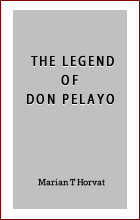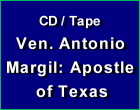Stories & Legends
 |
 |
 |
 |
 |
 |
 |
How a Ploughman Won Knighthood
In the reign of Kenneth III, anno 980, the Danes had invaded Scotland and a great battle was fought at Luncarty, near Perth.The Danes fought with such desperate bravery that at last they drove the Scots backward. In confusion they fled from the field. Down a long lane fenced on either side with high walls they fled, hotly pursued by the victorious Danes.
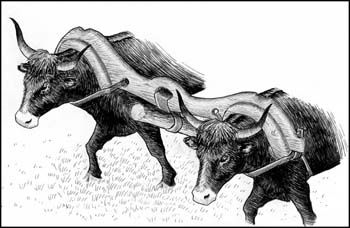 But in one of the fields near, a ploughman and his two sons were at work. When the old man saw how the Scots were fleeing, he seized the yoke from the neck of his oxen, and calling to his sons to do the same, he sprang into the lane. Side by side the three ploughmen, armed only with their wooden ox-yokes, stood barring the way.
But in one of the fields near, a ploughman and his two sons were at work. When the old man saw how the Scots were fleeing, he seized the yoke from the neck of his oxen, and calling to his sons to do the same, he sprang into the lane. Side by side the three ploughmen, armed only with their wooden ox-yokes, stood barring the way.
"What! Would ye flee and become the slaves of heathen kings?" cried the old man, whose name was Hay. "Nay, nay, turn back and rally! turn back and rally!, and die honorably in the field as free men."
So stoutly did he speak, such blows did he deal, that the Scots took heart again. They turned, and led by Hay, they turned to attack the on-coming Danes. And the Danes, thinking that a fresh army had come to help the Scots, were seized with fear and fled.
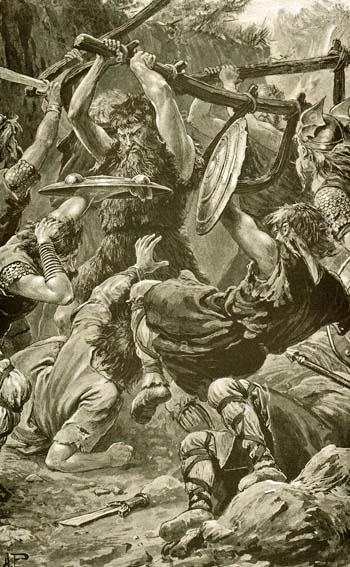 Then the Scots, who had been so nearly defeated, now filled with new hope and courage, chased them from the field. Many were killed in the battle, many more fell in the chase, and the victory of the Scots was great. But all the honor was given to the ploughman and his two sons, who had won the day after it seemed lost.
Then the Scots, who had been so nearly defeated, now filled with new hope and courage, chased them from the field. Many were killed in the battle, many more fell in the chase, and the victory of the Scots was great. But all the honor was given to the ploughman and his two sons, who had won the day after it seemed lost.
The King then commanded that these three brave men should be dressed in splendid robes, and brought before him. But they refused the robes of silk and satin offered to them, and they prepared to go before the King as the ploughmen that they were, carrying their wooden ox-yokes upon their shoulders.
Thus, followed and surrounded by a rejoicing crowd, they came to the King's palace. All the courtiers wore their most splendid robes. The King sat upon his throne, his golden crown upon his head. Before him stood Hay and his sons in their peasant clothing.
"What can I do for you?" asked the King, "What can I give to you as a reward for your great services?"
"Give me, sire," replied Hay, "as much land as a falcon will fly over without alighting."
"That is but modest asking," said the King. "Let it be done."
Then the King and all his courtiers went out into the fields near the palace, and watched as a falcon was let loose. As soon as the bird was free it rose high in the air, then spreading its wings it flew away and away.
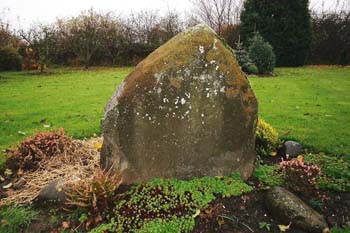 On and on it flew, on and on till, to those who watched, it seemed but a speck in the distance. Then it disappeared. The horsemen, who followed its flight, rode fast and they too were lost to sight. On and on the falcon flew, till at last it alighted upon a stone.
On and on it flew, on and on till, to those who watched, it seemed but a speck in the distance. Then it disappeared. The horsemen, who followed its flight, rode fast and they too were lost to sight. On and on the falcon flew, till at last it alighted upon a stone.
It had flown six miles without stopping, and all that six miles of land on the river Tay in the district of Gowrie was given to Hay and his sons to be theirs forever. That land was afterwards called Errot.
And the King, being desirous to elevate Hay and his sons from their humble rank in life to the order of nobility, made them knights and assigned them a coat of arms. He ordered them to have a shield of silver, and that upon it three red escutcheons, or shield, should be painted to show that the ox-yokes of Hay and his sons had been as shields to the King and country.
There is still a great family whose clan name is Hay, and who bear these same arms with the motto, Serva jugum, which means 'Keep the yoke.'
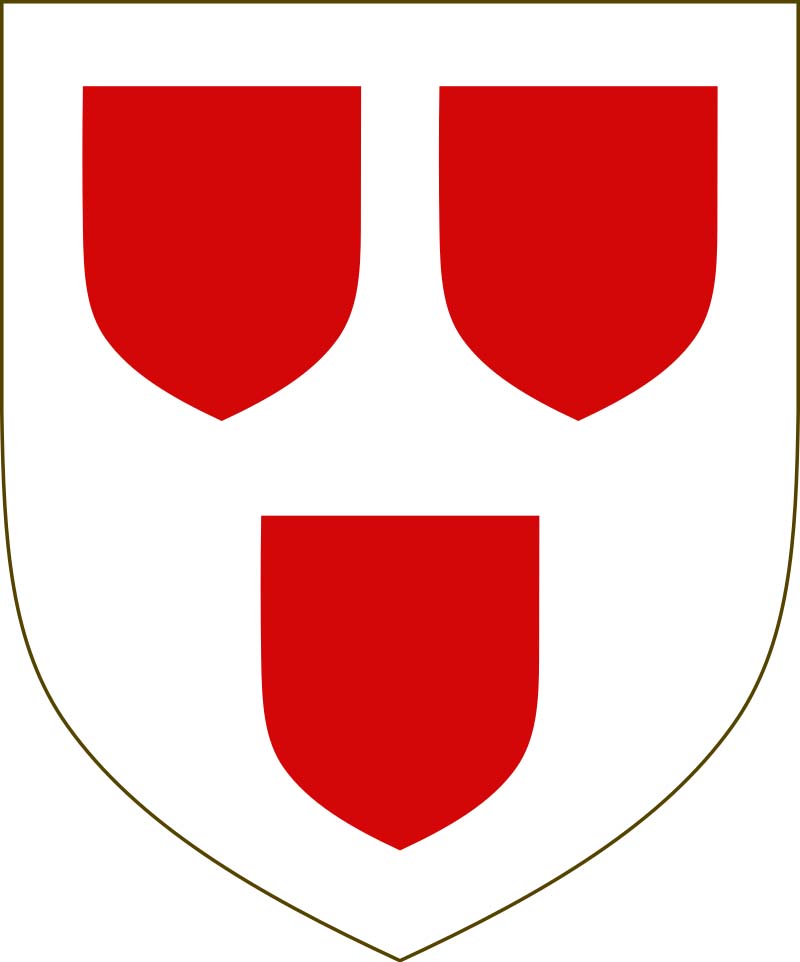
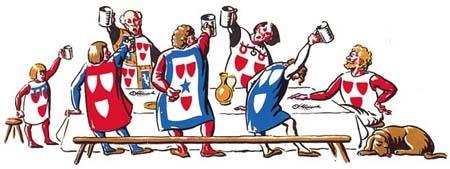

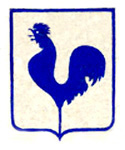

A pair of yoked oxen
"What! Would ye flee and become the slaves of heathen kings?" cried the old man, whose name was Hay. "Nay, nay, turn back and rally! turn back and rally!, and die honorably in the field as free men."
So stoutly did he speak, such blows did he deal, that the Scots took heart again. They turned, and led by Hay, they turned to attack the on-coming Danes. And the Danes, thinking that a fresh army had come to help the Scots, were seized with fear and fled.

The ploughmen enter the Battle of Luncarty
The King then commanded that these three brave men should be dressed in splendid robes, and brought before him. But they refused the robes of silk and satin offered to them, and they prepared to go before the King as the ploughmen that they were, carrying their wooden ox-yokes upon their shoulders.
Thus, followed and surrounded by a rejoicing crowd, they came to the King's palace. All the courtiers wore their most splendid robes. The King sat upon his throne, his golden crown upon his head. Before him stood Hay and his sons in their peasant clothing.
"What can I do for you?" asked the King, "What can I give to you as a reward for your great services?"
"Give me, sire," replied Hay, "as much land as a falcon will fly over without alighting."
"That is but modest asking," said the King. "Let it be done."
Then the King and all his courtiers went out into the fields near the palace, and watched as a falcon was let loose. As soon as the bird was free it rose high in the air, then spreading its wings it flew away and away.

Hawk's stone still shows the place where the raven landed
It had flown six miles without stopping, and all that six miles of land on the river Tay in the district of Gowrie was given to Hay and his sons to be theirs forever. That land was afterwards called Errot.
And the King, being desirous to elevate Hay and his sons from their humble rank in life to the order of nobility, made them knights and assigned them a coat of arms. He ordered them to have a shield of silver, and that upon it three red escutcheons, or shield, should be painted to show that the ox-yokes of Hay and his sons had been as shields to the King and country.
There is still a great family whose clan name is Hay, and who bear these same arms with the motto, Serva jugum, which means 'Keep the yoke.'


The Hay Clan continues to wear the coat of arms given to them by the King

Adapted from Scotland's Story by H E Marshall, London: TC & EC Jack Ltd,
and John Burke's "Peerage", 1832 edition
Posted October 2, 2021
and John Burke's "Peerage", 1832 edition
Posted October 2, 2021





